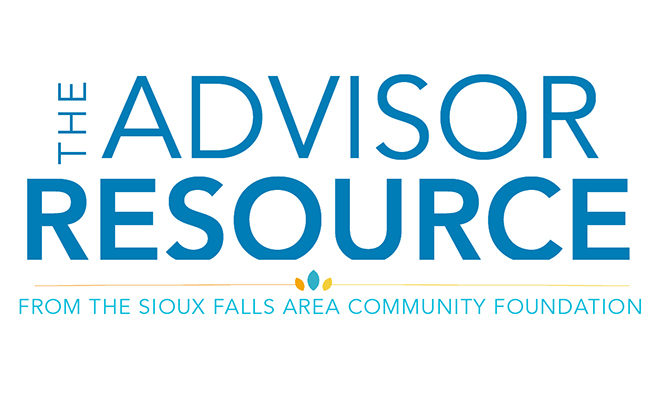Latest News
The Advisor Resource: February 2020

At the Community Foundation, our goal is to serve as an extension of a professional advisor's team. Offering our expertise in philanthropic planning and community investment, we're here to help build a tailored giving plan that aligns with an individual's interests, values and charitable goals, while also maximizing important tax advantages and key benefits.
The Advisor Resource is an occasional eNewsletter designed to provide attorneys, accountants and financial advisors with helpful resources and information to better serve their clients.
Our February 2020 issue includes:

IN FOCUS: Legislation Brings Big Changes Related to IRAs and Charitable Giving
Three Points You'll Want to Know About the SECURE Act
It seems like the IRA Charitable Rollover rules change every few years, and last year was no exception.
In December 2019, Congress passed the SECURE Act, legislation that puts a number of provisions in place designed to strengthen retirement security across the country.
When it comes to charitable giving related to IRAs, here are a few significant changes you’ll want to be aware of as you work with your clients:
- RMD Age Changes: One major change from the SECURE Act: The required minimum distributions (RMD) increased from age 70 ½ to 72. While this significant change effects distributions, it's important to note it does not impact IRA qualified charitable distributions (QCD). The minimum age for QCDs remains at 70 ½, meaning an individual can make QCDs from a retirement account to a charity before they are required to make distributions. However, any QCDs made before age 72 won’t offset any RMD amount and there is no credit for future years. Even though donor-advised funds are not permitted as recipients, other funds at the Community Foundation are eligible to receive qualified charitable distributions.
- No More Maximum Age for IRA Contributions: The bill also eliminates the maximum age for traditional IRA contributions, which was previously capped at 70 ½ years old. However, since contributions are eligible for a deduction from gross income, the SECURE Act includes a stipulation that prevents double-dipping with a tax-free distribution — that caveat states that the cumulative total of contributions into the IRA after age 70 ½ will be reduced from future tax-free charitable distributions.
- Goodbye to the Stretch IRA: Among the changes enacted by the SECURE Act, which became law on December 20, 2019, is a provision eliminating the so-called stretch IRA. This change, which came as a surprise to many wealth advisors, requires that non-spousal beneficiaries of a decedent's IRA draw down the funds over a 10-year period, rather than giving them the option to take the distributions over the rest of their lives. Although exceptions apply for certain beneficiaries, this makes IRA assets even more attractive from a tax perspective as naming charities, such as your clients’ fund at the Foundation, rather than individuals, as IRA beneficiaries. Unlike lifetime QCDs, donor advised funds can be the beneficiary of an IRA as part of estate planning.
Questions? Want to learn more about these changes and the opportunities available to your clients for charitable giving through their IRAs at the Community Foundation? Let us know —we can help your clients navigate the details.

Charitable Planning is Essential Prior to Selling a Business
A new decade frequently inspires closely-held business owners to start thinking about an exit strategy. Before your business-owner client starts putting out feelers to potential acquirers, be sure to counsel your client about the benefits of contributing an ownership interest to a charitable organization, especially to a flexible donor advised fund at the Community Foundation.
No doubt your client has substantial unrealized capital gains that have accrued in the business over the years. Upon a sale, capital gains tax will be triggered on the proceeds of the client's asset. No capital gains tax will apply, however, to any portion of the business owned by a charitable organization. The charity will net 100 cents on the dollar for the portion it owns. So, in the case of an interest in the business owned by a donor advised fund at the Community Foundation, the proceeds of the sale will create an immediate "charitable giving account" for the business owner to enjoy by recommending grants from the proceeds to favorite charities, in whatever amounts and according to whatever schedule the business owner desires.
It is critical that no deal is on the table at the time of the contribution. Call us in the early planning stages to discuss the unique details for each situation.

Earn Your Chartered Advisor in Philanthropy Designation
Next CAP Cohort Begins in May
BY MARY KOLSRUD, VICE PRESIDENT FOR PHILANTHROPY
If someone asked you what kind of legacy you wanted to leave – to your family, to society, to the world at large, what would you say?
It’s a tough question – but a worthy one; and it’s what set the stage for a year-long journey of thoughtful discussion, exploration and discovery by Jennifer Bunkers of Boyce Law Firm, Stacy Erdmann of Eide Bailly LLP and myself last year as we completed the Chartered Advisor in Philanthropy (CAP®) course, a specialized training offered through the American College of Financial Services.
The graduate-level coursework provided us with the knowledge and tools necessary to help our clients and donors articulate and advance their highest aspirations for self, family and society, while also helping us develop a deeper understanding of the tax advantages of charitable giving.
Because of the course, Jennifer, Stacy and I each have a new perspective and deeper understanding of planning for philanthropic impact.
Are you interested in learning more about how to help your clients plan for their legacy? Do you want to join the top network of planners who are working to make our communities better for future generations? Consider applying for the next Chartered Advisor in Philanthropy (CAP®) cohort hosted by the Community Foundation.
The next CAP cohort begins in May. Contact me if you're interested in learning more!
See more Resources for Advisors.
Interested in receiving The Advisor Resource? Send us a note and we'll add your name to the distribution list!
